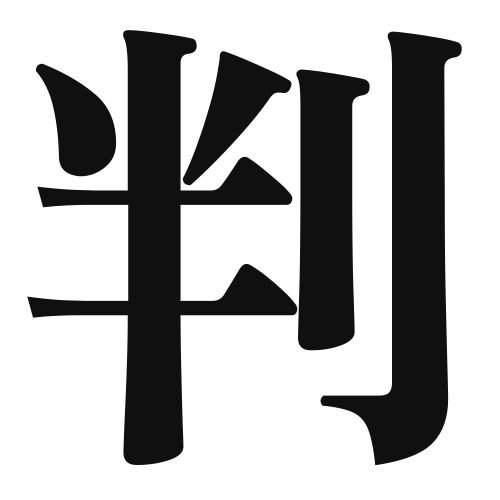1. Overview of Meaning
The kanji “判” (han) generally means “to judge,” “to decide,” or “to distinguish.” It is often associated with the act of making a decision or determining the quality of something.
2. Formation and Radicals
The kanji “判” is a combination of two components: the left part “刀” (katana), which means “sword,” and the right part “半” (han), which means “half.” This combination suggests the idea of cutting or dividing, which relates to the concept of making judgments.
The radical of “判” is “刀” (katana), indicating its connection to actions involving cutting or decision-making.
3. Examples of Usage
Common words and phrases that include “判” are:
- 判決 (はんけつ, hanketsu) – judgment, verdict
- 判断 (はんだん, handan) – judgment, decision
Example sentences in daily conversation:
- この問題をどう判断しますか? (このもんだいをどうはんだんしますか?) – How will you judge this issue?
- 彼の判決は公平でした。 (かれのはんけつはこうへいでした。) – His judgment was fair.
4. Synonyms and Antonyms
Similar kanji with related meanings include:
- 決 (けつ, ketsu) – to decide, which emphasizes the finality of a decision.
- 識 (しき, shiki) – to recognize, which focuses more on the act of identifying rather than judging.
Antonyms include:
- 迷 (まよ, mayo) – to hesitate, which indicates indecision or uncertainty.
5. Cultural and Historical Background
The kanji “判” has significant ties to Japanese culture, particularly in the context of law and decision-making. It is often used in legal terminology and discussions about justice.
Proverbs and idiomatic expressions that include “判” are:
- 判を押す (はんをおす, han o osu) – to stamp or approve, often used in the context of finalizing decisions.
